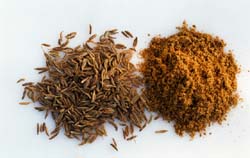Essential Oils
Soft Extracts
- Coleus Soft Extract
- Coleus Extract Powder
- Ginger Soft Extract
- Neem Soft Extract
- Roasted Coffee Extract (Arabica)
- Vanilla Soft Extract
Spices Oleoresins

Botanical Name: Cuminum cyminum
Plant Part: Seeds
Extraction Method: Supercritical Fluid Extraction Process (SCFE) also called Co2 Extraction process.
Description: Cumin (Cuminum cyminum) is in the parsley family of essential oils. The oil is obtained through co2 extraction. Cumin is a small, delicate, annual herb more like a ground cover. It grows about 20 inches high and has slender stems, dark green feathery leaves and small pink or white flowers followed by small seeds.
Color: Clear to pale yellow
Cumin oil extracts are used for medicinal purposes and food flavouring. The properties include use as an antiseptic, anti toxic, anti-oxidant, antispasmodic, aphrodisiac, digestive, bactericidal, larvicidal, emmenagouge, diuretic in nature, a nervine and as a stimulant. Cumin essential oil is used as a warming oil to relieve muscular pains and in osteoarthritis. For the digestive system it is a stimulant that helps with colic, dyspepsia, flatulence, bloating and indigestion. Essential oil of Cumin is known to have a beneficial effect on migraine, headaches, and exhaustion. Cumin essential oil has anti-inflammatory property. It is an antiviral; aids digestion protects liver and stimulates immune system.
Consistency: Light to Medium
Note: Middle
Strength of Aroma: Medium
Cumin Oil mixes well with: Lavender, Rosemary, Chamomile, Angelica, Caraway, and other essential oils.
Precaution: Cumin has phototoxic properties and after application direct sunlight should be avoided. Also pregnant women and people with sensitive skin should avoid it.
Background: This is a traditional Middle Eastern spice used in making curries. It is vastly used in Ayurvedic medicines, as a stimulant and for digestive complaints like indigestion.


